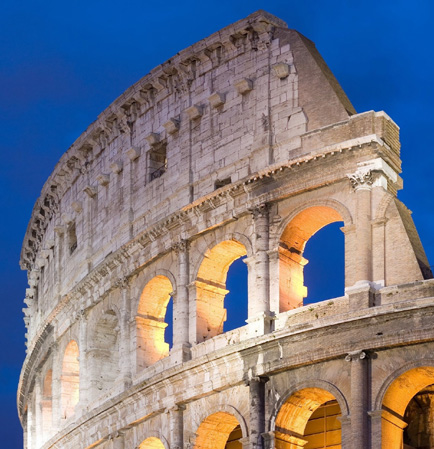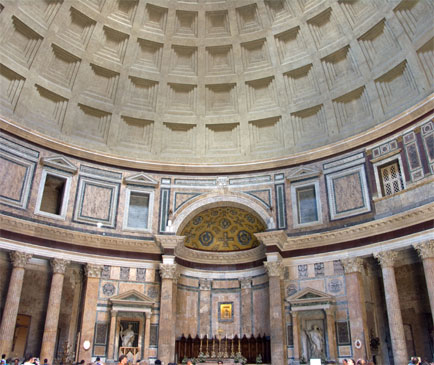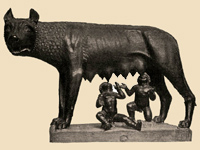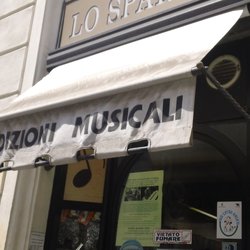
I am a man of Rome, Italy. Some of my ancestors, many centuries ago, were already citizens of Rome. So I guess I am a real Roman, or sort of, since some barbaric blood must unquestionably flow in my veins, Germanic probably and Gallic from the Alpine region.
My mother tongue is Italian, not very different from the Latin spoken by the common people at the times of the late Roman Empire.
The reason I am attempting to communicate in this Northern language – which I do not master entirely and which, though a bit chilly to my heart, I find not entirely deprived of charm – is that variety excites me like a drug and I am tired of talking mostly to my countrymen, this lingua franca, English, allowing me hopefully a wider exchange of ideas.
Why this blog

One reason, I have said, is wider communication.
But what can a Roman of today say to the world? Such a big statement (if there weren’t the Web to make it not entirely such.)
I think it is a great privilege to be born and to be raised here, such a special place, to the extent that something must have penetrated, something distinctive and worthy of being transmitted – in order to be able, in our turn, to receive.
I hope for comments from Western and non-Western people, since Rome and the Romans have a mediation nature that comes from the Mediterranean.
Rome in some way is more Mediterranean than European.
However, as she was already universal during the ancient Roman days, she has continued to be universal as a religious centre, like Mecca or Jerusalem, which makes Rome something way beyond Europe (*).
ψ
Religion will not be a central topic here (there excepting ancient religions, of course) since, greatly respecting all faiths I personally have none, being an agnostic.
I like to think that I am similar to those Romans of the past who counted mostly on knowledge and reason (the followers of Epicure, Ἐπίκουρος – one among many possible ancient examples.)
Three Reasons for Uniqueness

Ages have passed since this great city was the capital of the known world, this role now being played by New York, London or Shanghai, perhaps.
Rome is though unique in the first place because “among all the greatest cities of the ancient world – Nineveh, Babylon, Alexandria, Tyre, Athens, Carthage, Antiochia – she is the only one that has continued to exist without any interruption, never reduced to a semi-abandoned village but rather finding herself often in the middle of world events and, equally often, paying for that a price (**).”
Secondly, and more importantly, Rome is the city of the soul (as Byron, Goethe and Victor Hugo put it,) of our authentic Western soul, since Europe and the West were shaped here and these roots are sacred – to me surely, and I think and hope to most of us.
These roots we have to rediscover in order to better open up to others in a new spirit of humanitas and conciliation (two chief components of the everlasting Roman mind.)
We all here in the West must encourage a totally new attitude which may enable us to better face both our present crisis of values and the radical changes looming ahead which might cause our swift decline.
Lastly, Rome, the eternal city, is unique because she is also one of the most beautiful cities in the world, if not the most beautiful.
Beyond her imperial testimonies, her stupendous urban spaces and squares, even small piazzas and alleys radiate that “sacred aura” which comes from the millennia and to which ever increasing multitudes from every land come to pay their tribute.
The capital of our beloved and civilised French cousins, Lutetia Parisiorum (it’s how the Romans called Paris, after the Parisii, a tribe of the Gallic Senones,) was not but a village until the year 1000 AD. “1700 years younger than Rome! It shows, one can feel it (***).”
Fragments Sent in a Bottle

Scattered fragments of this special identity inserted in a bottle and sent across the Web: this shall be the activity of this blog.
The conveyor of the message is not so important in relation to the greatness of the source and to one ingredient this conveyor might, willingly or unwillingly, possess: he perhaps being like a fossil from a distant past which is dead though, astoundingly enough, alive yet in so many Italians.
Let us admit it. In some central and especially southern areas of this country, minds and habits survive that may puzzle foreigners, historical remnants whose disadvantages towards modernity appear evident. Are they only disadvantages?
All Things Considered
This and other topics will be discussed here by a 60-year-old Roman (2014: 66) whose knowledge can be located at a medium level, with interfaces towards the upper and the lower layers of knowledge.
He will try his best to transmit something useful to others (and to himself) having been an ancient-history & literature educator for 16 years, then converted to Systems Engineering & Training for the last 14 years.
He hopes this blog will allow him to brush up humanities back, which is daunting at his age (not to mention the crazy idea of blogging in English, Italian and bits of other languages.)
ψ
If not profundity of knowledge, he might though have an advantage (still to be proved) over many foreign commentators even born in one of the ex-provinces of the ancient Roman Empire.
The plus of being a witness from right here.
The advantage of being a Man of Roma.











